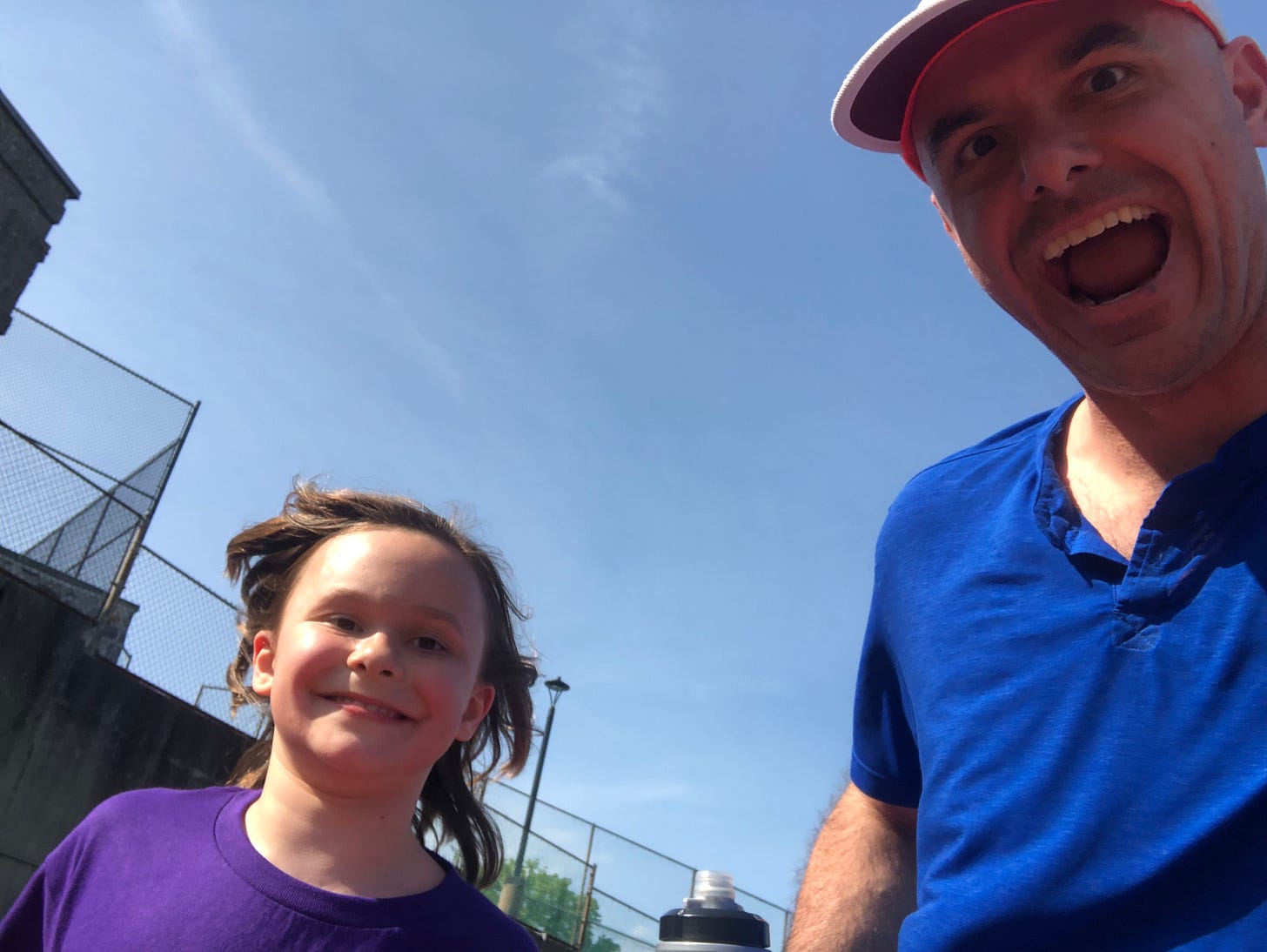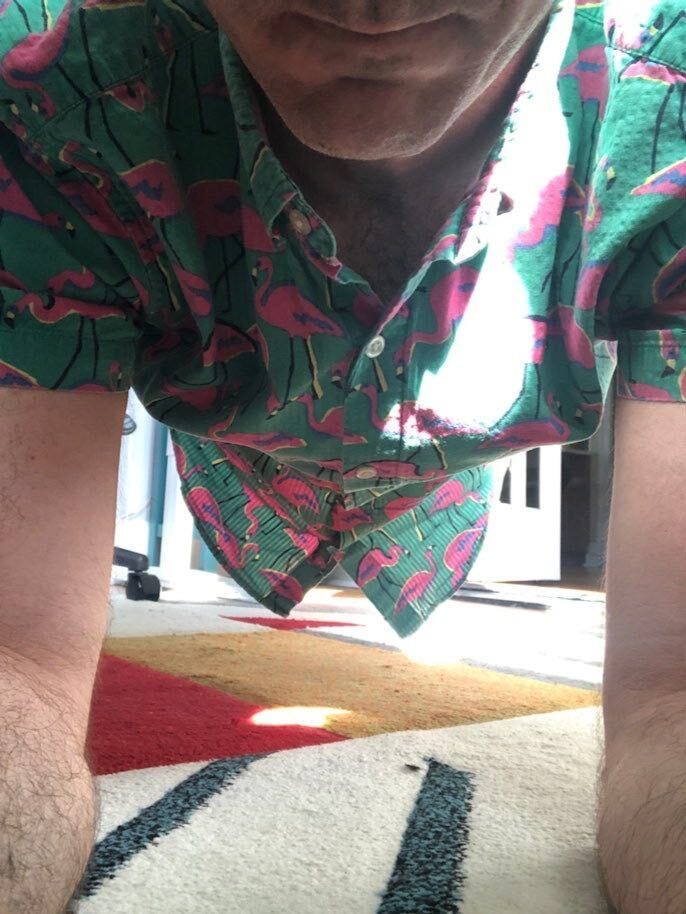Men today lack accountability, encouragement, and community. Without accountability, men act poorly. Without encouragement, men exhibit laziness, selfishness and poor health. Without community, men cascade towards loneliness, isolation and peril.
We believe a world served by better men - friends, citizens, husbands, humans, fathers, sons, brothers, uncles, colleagues, lovers, workers, and humans - benefits us all.
Becoming — and being — a dad changed me. That should be self-evident. And it is. Yet in some ways, the biggest changes were the ones seemingly antithetical to what I expected: my waistline shrank, my resting heart rate lowered, and my mental health improved.
As a father of two girls, I feel fortunate to have found
—“a weekly newsletter on modern fatherhood, providing an open and honest conversation between a community of dads who are trying to be a little bit better” — to commiserate and learn from others. But as the aging father of two girls — the oldest approaching puberty — the most beautiful part of the community has been sharing the mistakes I’ve made and doling out advice for those new dads in the comments and on the community platform.Last week, I was grateful and humbled when
“handed the keyboard over” to me where I shared how gusto, guilt and grace guided my quest in finding father fitness. While the original post can be read in its entirety, where you will also find Kevin’s wit, wisdom and recommendations, I’ve included my piece here for ease of reading.Thanks again, Kevin, for taking a chance on me, being a much-needed editor, and giving me an audience. To the dads out there, or those dads-to-be1, I highly recommend joining his community.

Running has always played a part in my life. As a kid, it was the lead actor, but burned out like so many child stars in early adulthood. But as a father, running made a comeback like Jason Bateman returning to the silver screen in Arrested Development, decades after hitting our screens as a kid in Little House on the Prairie.
I started running at an early age. Up the stairs from the basement to greet my dad coming home from work at the first jingle of his keys. Running up and down the pitch while playing midfield in youth soccer. Flashlight tag, kick the can, and ghost in the graveyard were all filled with quick sprints over long nights. Heck: we even held recess races in elementary school—I made a trophy out of aluminum foil for the winner— because running was something fun to do.
So it wasn’t a shock when I signed up for our middle school’s club cross country team. I may have—like the t-shirt says— loved the fact that our sport was every other sports’ punishment, but that wasn’t the draw. In high school, I came to the realization there’s no better team sport than cross country. The improvements in physical health, and a budding love of exercise, were only part of it. The social health aspects—boys and girls teams stretching together before workouts, gorging ourselves at pre-meet pasta parties, traveling to meets on the team bus, cheering each other on during our respective races—were what I remember most.
I could eat whatever I wanted when I was younger. My parents were convinced I had a tapeworm. I vividly recall one halcyon day during McDonald’s Monopoly sweepstakes—when others were trying to cheat their way to big bucks and all we cared about was free food and beverages—we spent a post-practice evening ripping winning tickets off the Big Macs, fries and drinks. After four large fries, and two milkshakes, I finished the last bite of a fourth Big Mac in the parking lot. And then went home for dinner. Despite nights like that, I finished senior year at 6’3” and 165 pounds.
Forrest Gump saying “I'm pretty tired… think I'll go home now” in Monument Valley after 15,000 (fictional) miles, I left high school and stopped running. The weight piled on quick: I was only through my first semester but had already attained my Freshman Fifteen on my way to a full Freshman Fifty.
They say insanity is doing the same thing over and expecting different results; over the next ten years, I did nothing and expected the same athletic-kid-who-could-eat-anything I once was. I averaged 1.5 miles per year, all of them with the thought “I can still run like I used to”. The irony is that I had all the time in the world in my 20s, but I did jack shit with it.
They say fatherhood changes things. When our oldest daughter was born, four months after I turned 30, we did the most logical thing: we moved from the East Coast to California to try this parenting thing on our own. She was four weeks old. By this point I was 250 pounds, but as Rod Stewart once crooned, I wore it well. While toting my daughter around Pasadena in a Baby Bjorn, with thoughts of my father’s waistline expanding as he aged, it hit me: if I’m this out of breath now, how am I ever going to keep up with her as she grows up?
So I started running. To the end of the block and back. Then around the corner. And like George Costanza trying to find a parking space, those expanding concentric circles from our building got bigger and bigger. Like magic, the weight came off. Sure, I had some knee pain. But when I got an email from a close friend getting a crew together to do a Tough Mudder the following May, I signed up, and added push-ups to my repertoire to build some strength. With a gash on my knee – bloodied while trying to climb over the fence to enter the starting corral, yet spared major damage by the Dollar Store brace supporting that nagging injury – I gingerly took those first few steps. Thirty obstacles and thirteen miles later we crossed the finish line before I headed to the infirmary for eight stitches.
Moving back to New York later that spring, living blocks from Central Park, accelerated my running. The smell on a hot humid day, the metallic odor of worms after a fresh rain, the icy chill of frosted grass in my nostrils; a cascade of memories from my childhood running days like the beads of sweat on my forehead. Around the curves of the Harlem Hills, I’d belt out Bohemian Rhapsody - falsetto included - in its entirety. I’d laugh at the inside jokes from a high school fartlek workout, itself an outside joke.
Reliving my running youth with relish, I recalled I was at my academic best during cross country and track seasons. While I wasn’t yet the early-morning-runner I am today, the time commitments required to be a husband, dad, colleague, brother, son and friend acted as a similar forcing function—and just like any good procrastinator knows, the less time one has, the more focused one becomes. A local race every few weeks was made possible by evening runs home through the park. Down to 182 pounds as a result of going completely plant-based, I ran past our apartment at mile 21 of the NYC Marathon, kissed my wife, and daughters—the youngest just weeks old—on my way to my first marathon finish at the age of 33.
A move up the Harlem River Metro North line forced me to rethink my schedule. As a father, I’d come to understand the importance of taking time for myself, so I could be there for my wife and daughters. But I had to learn to love the dark and get used to falling asleep—sometimes before my kids—on the couch. Those evening solo runs became 5:00 am high-intensity interval training classes made up mostly of parents intentionally getting their heart rates up before their kids unintentionally did the same. This community almost got me through the rest of my thirties.
Covid shut that shit down overnight. With classes closed and no longer needing to head into the city every day for work, I took to solo runs on local trails before the kids logged on for remote school. Three days in a row, I saw what I still believe is the same owl swooping down in front of me. That memory remains vivid every time I’m out on the trails—or when I’m looking for that push out the door. I was many years back into eating meat by then, but had cut out alcohol completely (which I maintain was my pandemic secret weapon, at a time when many were doing the opposite). Yet when things opened up again, I felt the pull back towards community, getting my weekend miles in with a local running club. I even managed a 599-day running streak found at the confluence of encouragement, accountability, commitment, and foolishness.
With(out) apologies to Gordon Gecko, prioritizing the time for fitness taught me that guilt, for lack of a better word, is good. Guilt pushes me to get the most out of every workout, to savor each stride. When stepping away from my fatherly duties for an hour (or three), guilt encourages me to do my part around the house before heading out. It reminds me to be present when present instead of stuck in my phone, though I can always do better. And while that tinge of guilt hits me every time I sneak away to get in another set of push-ups on my way to 10,001 this month2, I can’t help but laugh as my wife sighs while uttering, “not again.”
Have I found father fitness? Perhaps. But like Elf on the Shelf, father fitness is elusive. Sometimes you get lazy, neglect to move it, come up with excuses, and end up right where things were the day before: feeling as sorry for yourself as you are for disappointing your kids. But I saw an alternate future when my oldest daughter was born and committed to making a change to be there for her. I learned the importance of encouragement through community and the multiplicative pleasures of my many solitudinal3 runs. I learned that when we become dads, we must remember that it’s not all we are: we, like Whitman said, contain multitudes.
My wife and kids noticed something, too: when my mood soured, my wife would ask if I ran today, and when I hadn’t, she’d push me out the door. And she was right: I’d leave for a run full of piss and vinegar and come back full of vim and vigor—a better husband, a better father—those endorphins doing their job.
These days, I’m trying to be better about granting myself the grace to miss a workout - or to step away from my family to get that workout in after all - and to realize that, sometimes it’s OK to aim for good enough: a good enough runner, a good enough husband, a good enough colleague, a good enough friend, a good enough dad. And when your daughter is old enough to ask to go for a run with you? Well, that’s about as good as it gets.
In the spirit of finding fitness, father or otherwise, why not join us in our June 1,0001 Challenge where we’re counting the seconds of plank holds? Our Slack4 community is here to help get us there, together.
I’m looking at you, Andrew.
Why 10,001? You can always do one more. But you can always start with one.
Yes, it’s not a word, but you had to check too, right?
Yes, I know what you’re going to say: Slack sucks. And we agree. But as Winston Churchill would likely say, Slack is the worst form of digital communication except for all others.








Happy you found your way here Jeremy, and a pleasure to get this essay up on the site.